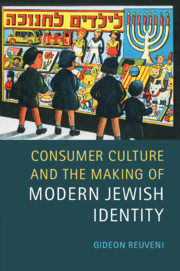Refine search
Actions for selected content:
26946 results in Economic history

Consumer Culture and the Making of Modern Jewish Identity
-
- Published online:
- 30 August 2017
- Print publication:
- 07 August 2017
Business Enterprise and Globalization: Towards a Transnational Business History
-
- Journal:
- Business History Review / Volume 91 / Issue 3 / Autumn 2017
- Published online by Cambridge University Press:
- 24 August 2017, pp. 511-535
- Print publication:
- Autumn 2017
-
- Article
- Export citation
RHE volume 35 issue 2 Cover and Front matter
-
- Journal:
- Revista de Historia Economica - Journal of Iberian and Latin American Economic History / Volume 35 / Issue 2 / September 2017
- Published online by Cambridge University Press:
- 23 August 2017, pp. f1-f3
- Print publication:
- September 2017
-
- Article
-
- You have access
- Export citation
RHE volume 35 issue 2 Cover and Back matter
-
- Journal:
- Revista de Historia Economica - Journal of Iberian and Latin American Economic History / Volume 35 / Issue 2 / September 2017
- Published online by Cambridge University Press:
- 23 August 2017, pp. b1-b8
- Print publication:
- September 2017
-
- Article
-
- You have access
- Export citation
Organization Theory in Business and Management History: Present Status and Future Prospects
-
- Journal:
- Business History Review / Volume 91 / Issue 3 / Autumn 2017
- Published online by Cambridge University Press:
- 15 August 2017, pp. 457-481
- Print publication:
- Autumn 2017
-
- Article
- Export citation
12 - Spending Power and Its Discontents
- from Part III - Homo Judaicus Consumens
-
- Book:
- Consumer Culture and the Making of Modern Jewish Identity
- Published online:
- 30 August 2017
- Print publication:
- 07 August 2017, pp 218-233
-
- Chapter
- Export citation
Part I - Narratives of Belonging
-
- Book:
- Consumer Culture and the Making of Modern Jewish Identity
- Published online:
- 30 August 2017
- Print publication:
- 07 August 2017, pp 1-96
-
- Chapter
- Export citation
5 - Emancipation through Consumption
- from Part II - The Politics of Jewish Consumption
-
- Book:
- Consumer Culture and the Making of Modern Jewish Identity
- Published online:
- 30 August 2017
- Print publication:
- 07 August 2017, pp 105-121
-
- Chapter
- Export citation
8 - The Consumption of Jewish Politics
- from Part II - The Politics of Jewish Consumption
-
- Book:
- Consumer Culture and the Making of Modern Jewish Identity
- Published online:
- 30 August 2017
- Print publication:
- 07 August 2017, pp 153-172
-
- Chapter
- Export citation
Contents
-
- Book:
- Consumer Culture and the Making of Modern Jewish Identity
- Published online:
- 30 August 2017
- Print publication:
- 07 August 2017, pp v-vi
-
- Chapter
- Export citation
2 - Ethnic Marketing and Consumer Ambivalence in Weimar Germany
- from Part I - Narratives of Belonging
-
- Book:
- Consumer Culture and the Making of Modern Jewish Identity
- Published online:
- 30 August 2017
- Print publication:
- 07 August 2017, pp 25-65
-
- Chapter
- Export citation
Acknowledgments
-
- Book:
- Consumer Culture and the Making of Modern Jewish Identity
- Published online:
- 30 August 2017
- Print publication:
- 07 August 2017, pp xix-xxii
-
- Chapter
- Export citation
11 - The World of Jewish Goods
- from Part III - Homo Judaicus Consumens
-
- Book:
- Consumer Culture and the Making of Modern Jewish Identity
- Published online:
- 30 August 2017
- Print publication:
- 07 August 2017, pp 203-217
-
- Chapter
- Export citation
Figures
-
- Book:
- Consumer Culture and the Making of Modern Jewish Identity
- Published online:
- 30 August 2017
- Print publication:
- 07 August 2017, pp vii-viii
-
- Chapter
- Export citation
9 - The Cost of Being Jewish
- from Part III - Homo Judaicus Consumens
-
- Book:
- Consumer Culture and the Making of Modern Jewish Identity
- Published online:
- 30 August 2017
- Print publication:
- 07 August 2017, pp 175-189
-
- Chapter
- Export citation
10 - Place and Space of Jewish Consumption
- from Part III - Homo Judaicus Consumens
-
- Book:
- Consumer Culture and the Making of Modern Jewish Identity
- Published online:
- 30 August 2017
- Print publication:
- 07 August 2017, pp 190-202
-
- Chapter
- Export citation
3 - The Jewish Question and Changing Regimes of Consumption
- from Part I - Narratives of Belonging
-
- Book:
- Consumer Culture and the Making of Modern Jewish Identity
- Published online:
- 30 August 2017
- Print publication:
- 07 August 2017, pp 66-81
-
- Chapter
- Export citation
Part II - The Politics of Jewish Consumption
-
- Book:
- Consumer Culture and the Making of Modern Jewish Identity
- Published online:
- 30 August 2017
- Print publication:
- 07 August 2017, pp 97-172
-
- Chapter
- Export citation
1 - Producers, Consumers, Jews, and Antisemitism in German Historiography
- from Part I - Narratives of Belonging
-
- Book:
- Consumer Culture and the Making of Modern Jewish Identity
- Published online:
- 30 August 2017
- Print publication:
- 07 August 2017, pp 3-24
-
- Chapter
- Export citation
6 - Boycott, Economic Rationality, and Jewish Consumers in Interwar Germany
- from Part II - The Politics of Jewish Consumption
-
- Book:
- Consumer Culture and the Making of Modern Jewish Identity
- Published online:
- 30 August 2017
- Print publication:
- 07 August 2017, pp 122-143
-
- Chapter
- Export citation
